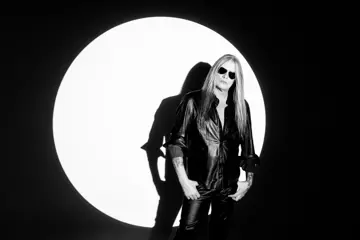 CSS
CSS"Of course I'm a feminist!” yelps Luísa Hanae Matsushita, aka Lovefoxxx, leader of Brazil's electro-pop outfit Cansei de Ser Sexy. “I don't understand any woman who would say they're not. I'm for equality for everyone; all I see feminism being is demanding your rights as a human-being. I believe in love, I believe in respect, I believe in kindness. Those are values I don't think there are enough of in the world.”
Matsushita, 29, is talking big-picture beliefs and humanist values because, as has happened so much in the promotion for CSS's fourth LP, Planta, she's speaking about Brazil. As one of the country's most visible pop exports, Matsushita has found herself often discussing the rise of mass public protests across Brazil in 2013.
“We're asked a lot to talk about it, and it's difficult, because it's something we're following online – that we're reading about online, watching videos of,” says Matsushita, from on the road 'somewhere in Ohio'. “Watching it from afar, it's hard to know exactly what's going on, because the manifestation has grown so big, so vast, and has lost real direction, real specific goals for change. And now right-wing people are becoming involved, so it's getting a bit weird, and we don't know how serious it is anymore. But Brazil doesn't manifest much, so it's really meaningful that it's happening.”
Growing up in Campinas outside of São Paulo, Matsushita – the daughter of Japanese immigrants – was far removed from Brazil's teeming poverty, and has spent much of her adult life outside of Brazil, including five years living in London and much of the last decade touring. She once described touring as “sucking her soul”: “It's always really hard. It's exhausting. It hurts. To detach from people is painful,” she says – but this life-on-the-road lifestyle is, for Matsushita, the culmination of a childhood dream.
Don't miss a beat with our FREE daily newsletter
“I always wanted to travel, since I was a kid,” Matsushita recounts. “My auntie was an air stewardess, back when they had to be pretty-looking. She was gorgeous! So I had her as a role model: she spoke many languages, she was very clever, very glamorous. So, ever since I was really young, like six or something, I would think about being an air stewardess so I'd be able to travel; I really wanted to see the rest of the world. And I have! But being in a band is way better than being an air-stewardess, because I get to live a lot.”
Growing up, Matsushita thought she'd be an illustrator, and moved to São Paulo at 16 to take up an internship with a fashion designer. She'd never made music when, at 19, her friend (and now former CSS member) Iracema Trevisan invited her to be in her “joke band”, who'd taken their Portuguese name from a Beyonce quote where the starlet had lamented that she was 'tired of being sexy'. “It was the most unpretentious thing I've ever joined,” Matsushita recounts. “We all thought that we would always only play in very horrible places, and we used to think that was very funny. We've never had any expectations, we only did things that we thought were good. We weren't chasing success, we were just trying to make ourselves laugh.”
After their debut, self-titled album became a huge international success – released on Sub Pop in the US, wildly hyped in the UK, and spawning indie-dance hits Music Is My Hot Hot Sex and Let's Make Love And Listen To Death From Above – things started to change. Their 2008 follow-up, Donkey, became the 'difficult second album', its recording a slog. “Donkey was a really bitter record,” Matsushita recalls. “There was so much bitterness, lots of bad band drama; I don't really want to talk about it, but we were really hurt by so many events.”
That band drama found members leaving; first Trevisan, and then, after 2011's La Liberación, multi-instrumentalist Adriano Cintra. As the band's sole male member, Cintra has often been painted as the man-who-actually-makes-the-music, a stereotype that was underlined when, upon leaving the band, he gave a bitter interview basically calling his ex-CSSers fame whores who couldn't play their instruments. Matsushita declines to talk about Cintra directly, but in discussing Planta, he's clearly in the subtext.
“Planta felt really relaxed to make, which was something we'd never experienced before,” says Matsushita. “We felt really liberated. We treated every song as its own thing, and everything we did was us working together to further the song, not our own personal agendas. We were working together for the music, not against each other to further our own causes.”
After making their first three LPs in Brazil, this one was recorded in Los Angeles with TV On The Radio's Dave Sitek, and features an appearance by Hannah Blilie of Gossip and a co-write with Tim Armstrong of Rancid(!). There's a strong reggae-leaning vibe on a bunch of the tracks, which are more synth-based; recalibrating the band's new four-piece lineup (Matsushita, drummer Carolina Parra, and guitarists Luiza Sá and Ana Rezende) around keyboards.
Touring Planta, CSS are rediscovering the simple joys of performing. “Yesterday, we were in Chicago, and I was having a tough day; I was feeling so, so sad, I really didn't want to go on stage. But the show was so good it 'cured' me from that mental state,” says Matsushita. “I know this sounds almost stupid to say, but people really come to our shows to have a good time. We always have really friendly crowds, nobody's trying to cause trouble. I feel a similarity between our crowd and us. Our interviews and our music attract similar kinds of people. We never have fights in our crowd; when I look out, usually all I see is people smiling a lot. Playing the show yesterday, the energy from the crowd made me feel so much better; and I'm sure it happens the other way around, too, that people can come to our shows, and maybe they're feeling kind of sad, but after we play they feel so much better. We really love playing shows.”















